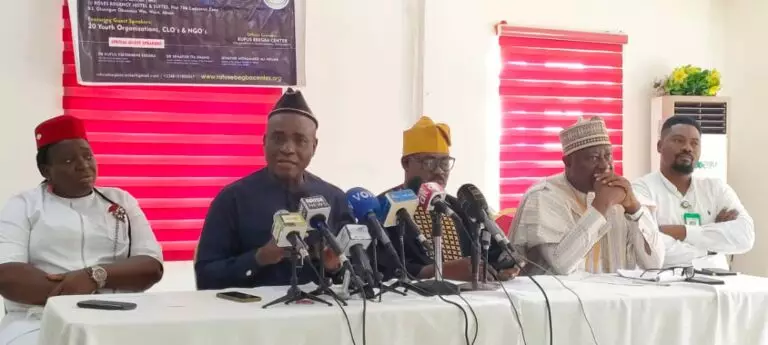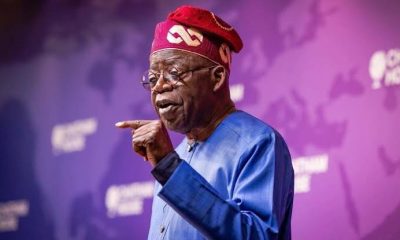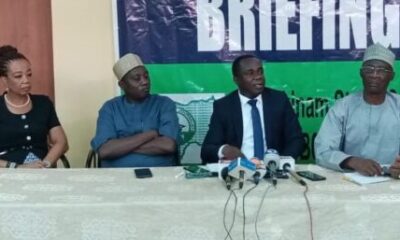National
Petrol subsidy removal: government is restructuring petroleum sector —- ex-senator

(Photo: A cross section of participants at the media chat, Middle left Dr Ita Enang, a former Senator of the Republic and Middle right Dr Rufus Ebegba the founder of Rufus Ebegba Centre for Leadership and Environmental Sustainability)
Dr Ita Enang a former Senator says the Federal Government is restructuring petroleum sector to ensure crude oil is refined locally and to cushion the effect of removal of petrol subsidy.
Enang spoke on Monday in Abuja at a stakeholders meeting titled “Nigeria Dialogue Media Chat” with the theme: “Our democratic Stability”.
The event was organised by Rufus Ebegba Centre for Leadership and Environmental Sustainability, an Environmental NGO.
He advised Nigerians not to rely on palliatives alone as a cushion to the effects of the subsidy removal.
Enang said removal of petrol subsidy has brought pains and the youths have expressed concern as it affects them.
“The alternative to petroleum is gas. That is why the President has created the office of the Minister of State on gas so that more engagement will be on gas,” he said.
Enang said gas would become popular because it is cheaper to run cars.
He said that the meeting was an effort by the centre to find out the concerns of the youths in the country and the way forward.
Dr Rufus Ebegba, the founder of the centre appealed to the Federal Government to look at some of the country’s policies and make Nigeria a better nation.
“Nigerians are complaining seriously and this borders on the sustainability of our democracy.
“We want to sustain our democracy so there is the need to dialogue with the youths who are more or less the key to this administration to ensure that the stability of this nation is attained,” Ebegba said.
He said that the essence of the dialogue is to advise the present administration on how to touch the lives of Nigerians in the area of security, infrastructure and health.
“Also the electioneering processes, the judiciary, the legislative and security are key issues in the country.
“The outcome of this meeting would be passed onto the government to see whether they can consider some of these proposals.
“We just want to see how we can touch humanity and then come out with ideas that can facilitate good and ideal leadership,” Ebegba explained.
The dialogue features 20 youth organisations and NGOs in Abuja.
Headline
EFCC bars dollar transactions, orders embassies to charge in naira

The Economic and Financial Crimes Commission has barred foreign missions based in Nigeria from transacting in foreign currencies and mandated them to use Naira in their financial businesses.
The EFCC has also mandated Nigerian foreign missions domiciled abroad to accept Naira in their financial businesses.
The anti-graft agency said the move is to tackle the dollarisation of the Nigerian economy and the degradation of the naira
The Commission, therefore, asked the government to stop foreign missions in Nigeria from charging visa and other consular services in foreign denominations.
The EFCC gave the advisory in a letter to the Minister of Foreign Affairs, Amb. Yusuf Tuggar, for onward transmission to all foreign missions in the country.
In the letter, the EFCC said it issued the advisory because the practice of paying for consular services in dollars was in conflict with extant laws and financial regulations in Nigeria.
In a letter dated April 5, 2024, which was addressed to the Minister of Foreign Affairs, Ambassador Yusuf Tuggar, titled: “EFCC Advisory to Foreign Missions against Invoicing in US Dollar,” the EFCC Chairman, Ola Olukoyede expressed dismay over the invoicing of consular services in Nigeria by foreign missions in dollars.
The EFCC cited Section 20(1) of the Central Bank of Nigeria Act, 2007, which makes currencies issued by the apex bank the only legal tender in Nigeria.
The letter read, “I present to you the compliments of the Economic and Financial Crimes Commission, and wish to notify you about the commission’s observation, with dismay, regarding the unhealthy practice by some foreign missions to invoice consular services to Nigerians and other foreign nationals in the country in United States dollar ($).
“It states that ‘the currency notes issued by the Bank shall be the legal tender in Nigeria on their face value for the payment of any amount’.
“This presupposes that any transaction in currencies other than the naira anywhere in Nigeria contravenes the law and is, therefore, illegal.”
The commission further stated that the rejection of the naira for consular services in Nigeria by certain missions, along with non-compliance with foreign exchange regulations in determining service costs, is not just unlawful but also undermines the nation’s sovereignty embodied in its official currency.
The letter continues: “This trend can no longer be tolerated, especially in a volatile economic environment where the country’s macroeconomic policies are constantly under attack by all manner of state and non-state actors.
“In light of the above, you may wish to convey the commission’s displeasure to all missions in Nigeria and restate Nigeria’s desire for their operations not to conflict with extant laws and regulations in the country.”
Diplomatic sources said yesterday, May 10, that some embassies were wondering whether the EFCC’s advisory represented the position of the Federal Government.
Headline
Suspend cybersecurity levy– Reps to CBN

The House of Representatives on Thursday asked the Central Bank of Nigeria to withdraw the circular directing all banks to commence charging a 0.5 per cent cybersecurity levy on all electronic transactions within the country, The Nation reports.
The motion on the urgent need to halt and modify the implementation of the cybersecurity levy was moved by the member representing the Obio/Akpor Constituency, Kingsley Chinda.
The House urged the CBN to withdraw the circular and “issue a more understandable one,” as Chinda had drawn the attention of the House to multiple interpretations of the CBN directive against the specifications in the Cybersecurity Act.
-

 Headline5 days ago
Headline5 days agoSuspend cybersecurity levy– Reps to CBN
-

 Business5 days ago
Business5 days agoNigeria needs over $2bn to revive Ajaokuta Steel Plant, says Minister
-

 Headline3 days ago
Headline3 days agoPrince Harry visits sick Nigerian soldiers in Kaduna
-

 Entertainment3 days ago
Entertainment3 days agoAMVCA Cultural Day: BBNaija’s Neo, Venita win Best Dressed Male, Female
-

 News5 days ago
News5 days agoShan George’s money returned to Zenith Bank account
-

 Metro3 days ago
Metro3 days agoEx-Sports Minister laments after hospital neglected him for hours over N80000 deposit
-

 Headline5 days ago
Headline5 days agoTinubu resumes work after foreign trip











